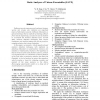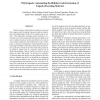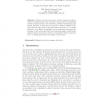84 search results - page 10 / 17 » Zero-Knowledge and Code Obfuscation |
146
click to vote
SP
2009
IEEE
15 years 9 months ago
2009
IEEE
Malware authors have recently begun using emulation technology to obfuscate their code. They convert native malware binaries into bytecode programs written in a randomly generated...
133
click to vote
ACSAC
2004
IEEE
15 years 6 months ago
2004
IEEE
Software security assurance and malware (trojans, worms, and viruses, etc.) detection are important topics of information security. Software obfuscation, a general technique that ...
112
Voted
ACSAC
2007
IEEE
15 years 8 months ago
2007
IEEE
Detecting the presence of buffer overflow attacks in network messages has been a major focus. Only knowing whether a message contains an attack, however, is not always enough to m...
122
Voted
ACSAC
2006
IEEE
15 years 8 months ago
2006
IEEE
Modern malware often hide the malicious portion of their program code by making it appear as data at compiletime and transforming it back into executable code at runtime. This obf...
125
Voted
ISW
2005
Springer
15 years 8 months ago
2005
Springer
Software protection is an area of active research in which a variety of techniques have been developed to address the issue. Examples of such techniques include code obfuscation, s...




